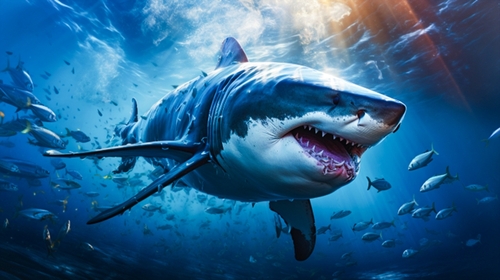
In a shocking revelation, scientists have discovered traces of cocaine in several shark species off the coast of Florida, highlighting a severe drug pollution problem in marine environments. The phenomenon, investigated in the Discovery Channel’s “Cocaine Sharks” during Shark Week, has garnered significant attention due to its alarming implications for marine ecosystems.
Marine biologist Tom Hird and environmental scientist Dr. Tracy Fanara led the investigation, noting unusual behavior in hammerhead and sandbar sharks. These species exhibited erratic swimming patterns, with some sharks even approaching humans, behavior atypical for these usually cautious creatures.
Sharks off the coast of Rio de Janeiro have tested positive for cocaine, scientists say.
Read more: https://t.co/VmYEoQdblP pic.twitter.com/cyMmTHi7fr
— WFLA NEWS (@WFLA) July 23, 2024
To understand these anomalies, researchers conducted experiments using simulated cocaine bales, observing that sharks showed a peculiar interest in these packages, often preferring them over other objects introduced in the experiment.
The cocaine found in the ocean likely originates from drug smugglers who dump their cargo to evade law enforcement. The U.S. Coast Guard and local beachgoers have reported multiple instances of cocaine bricks washing ashore or floating in coastal waters. In one notable incident, the Coast Guard recovered over 5,000 pounds of cocaine from the Caribbean Sea in June 2022.
More than a dozen sharks in Brazil have tested positive for cocaine — elevating concerns that the open waters in the area are being contaminated with drugs and affecting wildlife.
Full story: https://t.co/hPsHhqCQyx pic.twitter.com/kZlcERpZkY
— TMZ (@TMZ) July 24, 2024
This contamination poses significant risks to marine life. Cocaine, along with other pharmaceuticals and illicit drugs, enters waterways through various means, including wastewater discharge and direct dumping.
These pollutants can profoundly impact the health and behavior of marine species, potentially leading to long-term ecological disruptions. Dr. Fanara emphasized the broader issue of chemical pollution, stating that everything humans use or consume eventually ends up in natural water bodies, affecting marine ecosystems.
The experiments conducted by Hird and Fanara do not conclusively prove that sharks are ingesting cocaine, but they underscore the severe consequences of drug pollution. The peculiar behaviors observed in the sharks and the simulated experiments suggest a possible interaction with cocaine, raising concerns about the broader implications for marine life. Researchers advocate for more comprehensive studies to fully understand the extent of drug pollution and its impact on marine ecosystems.
This issue extends beyond sensational headlines. It is a stark reminder of human activity's unintended consequences on the environment. The presence of cocaine and other pollutants in the ocean represents a critical challenge for conservation efforts, highlighting the need for stricter regulations and better waste management practices to protect marine life from chemical contamination.











